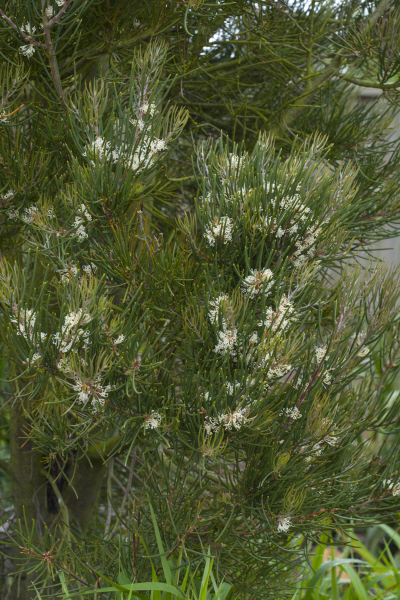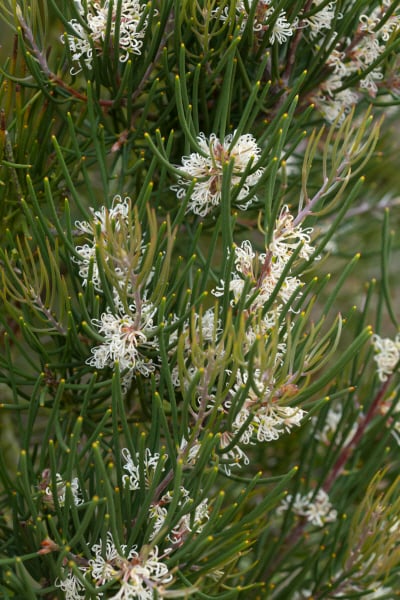Hakea lissosperma
needlebush
A columnar shrub or small tree with leathery, upright-growing, needle-like grey-green leaves. Clusters of tubular, white flowers with curly petals appear in spring and summer at the ends of the branches, followed by dark brown, smooth or warty, oval seed pods
Size
Ultimate height
2.5–4 metresTime to ultimate height
10–20 yearsUltimate spread
1.5–2.5 metresGrowing conditions
Moisture
Well–drainedpH
AcidColour & scent
| Stem | Flower | Foliage | Fruit | |
| Spring | White | Green Grey Silver | ||
|---|---|---|---|---|
| Summer | White | Green Grey Silver | ||
| Autumn | Green Grey Silver | Brown | ||
| Winter | Green Grey Silver |
Position
- Full sun
Aspect
South–facing
Exposure
Sheltered Hardiness
H4Botanical details
- Family
- Proteaceae
- Native to GB / Ireland
- No
- Foliage
- Evergreen
- Habit
- Columnar upright
- Potentially harmful
- Skin irritant/allergen. Wear gloves and other protective equipment when handling Pets (dogs): Skin irritant/allergen - see the HTA guide to potentially harmful plants for further information and useful contact numbers
- Genus
Hakea are evergreen trees and shrubs with leathery, often needle-like, leaves. Small tubular flowers, appearing in small clusters among the leaves, are followed by woody seed pods
- Name status
Correct
- Plant range
- Australia Tasmania
How to grow
Cultivation
In mild areas grow in fertile, well-drained, sandy, slightly acid soil in full sun. Under glass grow in a mix of equal parts loam, peat substitute or leaf mould and sharp sand in full light. Apply phosphate-free fertiliser monthly in the growing season
Propagation
Propagate by seed sown at 16°C as soon as ripe; sow singly to avoid root disturbance. Or root semi-ripe cuttings with bottom heat in summer
Suggested planting locations and garden types
- Coastal
- City and courtyard gardens
- Mediterranean climate plants
- Wall side borders
Pruning
Pruning group 1. May need restrictive pruning under glass
Pests
Generally pest-free
Diseases
May be susceptible to phytophthora root rot in moist soil
Love gardening
Sign up to receive regular gardening tips, inspiration, offers and more
View our Privacy Policy
Get involved
The Royal Horticultural Society is the UK’s leading gardening charity. We aim to enrich everyone’s life through plants, and make the UK a greener and more beautiful place.

